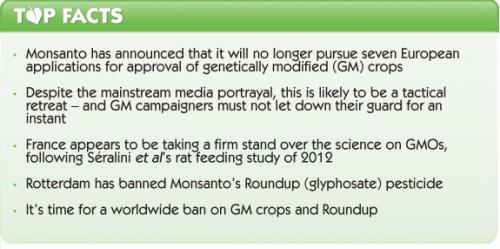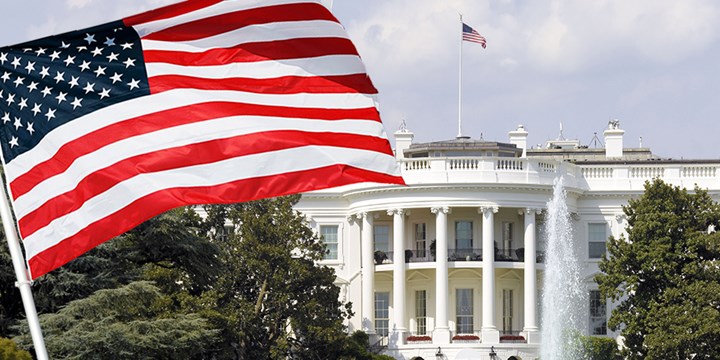Monsanto emulates BASF and apparently retreats from the European genetically modified (GM) crops market. France ends GM crop trials and announces important new GM research. Rotterdam bans Monsanto’s Roundup (glyphosate) herbicide. Definitely a good week for GM news, then – but if this encourages anti-GM campaigners to let their guard down, it wouldn't be the first time.
Monsanto smells the organic coffee
Monsanto has announced that it will no longer pursue EU approval of seven GM applications: five for maize (corn), including the controversial NK603 Roundup Ready maize; one for Roundup ready soybean 40-3-2; and one for H7-1 Roundup Ready sugar beets.

Woah there, tiger
On the surface, this is wonderful news for EU citizens concerned over moves to bring GM to their dinner plates against their wishes, as well as for anti-GM campaigners everywhere. But several important details should persuade them to remain on high alert:
- The EU and US governments recently began negotiations over the Transatlantic Trade and Investment Partnership (TTIP). As we’ve said before, we will be amazed if the drafters of the TTIP do not seek to relax the EU’s relatively strict approach to GM, in favour of the US’ largely regulation-free model
- Monsanto’s MON810 GM corn remains approved for use in food and animal feed throughout the EU, although, at present, its cultivation is limited to six EU Member States including Spain and Portugal
- Monsanto will continue and deepen its EU conventional seed production and breeding activities. Worryingly, this will mean an intensified focus on obtaining patents for conventionally grown plants, such as the patent recently granted for an easily harvested form of broccoli by the European Patent Office under patent EP1597965B1. Feelings are running high on this issue. The Avaaz petition: Monsanto vs. Mother Earth has, to date, notched up over 2 million signatures!
- Monsanto will also devote more attention to, “Enabling imports of biotech crops into the EU and the growth of our current business there”. In other words, depending on what the politicians decide, GM crops may still be winging their way onto EU citizens’ plates, but they’ll be grown in developing world countries with more forgiving GM approval regimes. And more GM animal feed, imported from countries like Brazil and Argentina, is most definitely on Monsanto’s EU agenda
- Monsanto’s official statement contains some very woolly wording: “We are doing a careful analysis application by application considering our obligations to business partners and this will inform which files will be withdrawn and when”. So Monsanto is setting no timetable for withdrawal of its GM applications, and any withdrawals will depend on the goodwill of Monsanto’s cronies. Plenty of wiggle room there!
This announcement by Monsanto may, therefore, be nothing more than the latest salvo in a grand public relations effort designed to persuade public and campaigners alike to take their eyes off the ball. Monsanto knows that bosses at the EU and USA, both fanatically pro-GM, can likely be relied upon to pass legislation giving the biotech industry a helping hand. Indeed, this process has already started. That Monsanto would simply retreat from the EU, as portrayed by the hopeless mainstream media, makes no sense at all.
France backs Séralini
The government of France has boldly allocated €2.5 million to a project designed to investigate the long-term health effects of eating GM foods. This is precisely the type of study that is sorely lacking, and which the biotech industry is keen to avoid.
Two factors make the French announcement particularly interesting. The government has, firstly, openly acknowledged that the 2-year rat feeding trial published by Séralini et al last year directly inspired its decision to fund new research. By declaring its faith in Séralini et al’s work, thereby risking the ire of pro-GM scientists, the French government may be signalling some genuine steel behind its intentions.
Popcorn time: France vs. the European Commission
Secondly and intriguingly, the French initiative will run in parallel to a €3 million EU project that involves a 2-year feeding trial with NK603 corn. Has the French government lost faith in the Commission’s ability to oversee an unbiased investigation into GM crops, especially maize NK603, having observed the official reaction to Séralini et al at the time? Of course, it remains to be seen whether either of these studies will now go ahead in light of Monsanto’s latest announcement.
France has also ended all GM field trials. In what looks like a juicy forthcoming confrontation between France and the European Commission, we’re backing France — and the vast majority of European citizens that continue to make clear they don't want to eat GM ingredients.
Roundup-free Rotterdam
Closing out a week of fascinating Monsanto-related developments is the news that the Dutch port city of Rotterdam has banned the company’s glyphosate-based pesticide, Roundup. Given the mounting scientific evidence that Roundup is a disaster for health, both human and animal, and the environment, we wholeheartedly applaud Rotterdam’s decision.
What’s needed now is for the forward-thinking attitude of Rotterdam to be exported worldwide, and for both Roundup and GM crops to be banned altogether until the science over their health and environmental consequences is settled.
Dr Rob Verkerk's GM warning published in New Statesman Centenary Issue








Comments
your voice counts
There are currently no comments on this post.
Your voice counts
We welcome your comments and are very interested in your point of view, but we ask that you keep them relevant to the article, that they be civil and without commercial links. All comments are moderated prior to being published. We reserve the right to edit or not publish comments that we consider abusive or offensive.
There is extra content here from a third party provider. You will be unable to see this content unless you agree to allow Content Cookies. Cookie Preferences